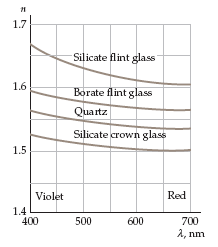In many transparent materials, dispersion causes different colors (wavelengths) of light to travel at different speeds. This can cause problems in fiber-optic communications systems where pulses of light must travel very long distances in glass. Assuming a fiber is made of silicate crown glass, calculate the difference in travel times that two short pulses of light take to travel 15 km in the fiber if the first pulse has a wavelength of 700 nm and the second pulse has a wavelength of 500 nm. Give your answer in ns. n 1.7 1.6 1.5 1.4 Violet 400 Silicate flint glass Borate flint glass Quartz Silicate crown glass 500 600 Red 700 λ, nm
In many transparent materials, dispersion causes different colors (wavelengths) of light to travel at different speeds. This can cause problems in fiber-optic communications systems where pulses of light must travel very long distances in glass. Assuming a fiber is made of silicate crown glass, calculate the difference in travel times that two short pulses of light take to travel 15 km in the fiber if the first pulse has a wavelength of 700 nm and the second pulse has a wavelength of 500 nm. Give your answer in ns. n 1.7 1.6 1.5 1.4 Violet 400 Silicate flint glass Borate flint glass Quartz Silicate crown glass 500 600 Red 700 λ, nm
Related questions
Question

Transcribed Image Text:In many transparent materials, dispersion causes different colors (wavelengths) of light
to travel at different speeds. This can cause problems in fiber-optic communications
systems where pulses of light must travel very long distances in glass. Assuming a fiber is
made of silicate crown glass, calculate the difference in travel times that two short pulses
of light take to travel 15 km in the fiber if the first pulse has a wavelength of 700 nm and
the second pulse has a wavelength of 500 nm. Give your answer in ns.
n
1.7
1.6
1.5
1.4
Violet
400
Silicate flint glass
Borate flint glass
Quartz
Silicate crown glass
500
600
Red
700
λ, nm
Expert Solution
Step 1
Given:
The diagram for different glasses' indexes of refraction is displayed in the figure below,

To find:
- The difference in travel times that two short pulses.
Trending now
This is a popular solution!
Step by step
Solved in 3 steps with 1 images
